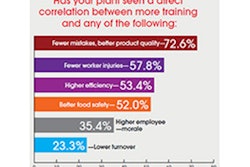CHICAGO (AP) — Our food was a little less safe, our workplaces a little more dangerous. The risk of getting sick was a bit higher, our kids' homework tougher to complete.
The federal government shutdown may have seemed like a frustrating squabble in far-off Washington, but it crept into our lives in small, subtle ways — from missed vegetable inspections to inaccessible federal websites.
The "feds" always are there in the background, setting the standards by which we live, providing funds to research cures for our kids' illnesses, watching over our food supply and work environment.
So how did the shutdown alter our daily routines? Here's a look at a day in the life of the 2013 government shutdown.
That sausage patty on your breakfast plate was safe as ever because meat inspectors — like FBI agents — are considered "essential" and remained at work. But federal workers who inspect just about everything else on your plate — from fresh berries to scrambled eggs — were furloughed.
The Food and Drug Administration, which in fiscal year 2012 conducted more than 21,000 inspections or contracted state agencies to conduct them, put off scores of other inspections at processing plants, dairies and other large food facilities. In all, 976 of the FDA's 1,602 inspectors were sent home.
About 200 planned inspections a week were put off, in addition to more than 8,700 inspections the federal government contracts state officials to perform, according to FDA spokesman Steven Immergut. That included unexpected inspections that keep food processors on their toes.
It worried Yadira Avila, a 34-year-old mother of two buying fruit and vegetables at a Chicago market.
"It's crazy because they (the FDA) sometimes find the bacteria," she said.
The FDA also stopped doing follow-ups on problems it previously detected at, for example, a seafood importer near Los Angeles and a dairy farm in Colorado.
And what about the food that made it to your plate? The federal Centers for Disease Control and Prevention in Atlanta, which furloughed 9,000 of its 13,000 workers, said the shutdown slowed its response to an outbreak of salmonella in chicken that sickened people in 18 states.





















